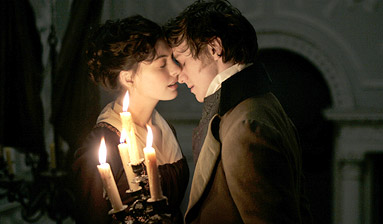
Back in 1795 in Hampshire, England, Jane Austen may or may not have had a romance with an Irish law student named Tom Lefroy. It appears that, somewhat like Emily Dickinson in the States, Austen mostly led a quiet, private life with her family even as she wrote and published several great novels, most notably Pride and Prejudice and Emma. Since then, Austen has become a favorite author for many. I have known people known as Janeites who religiously read all of Austen’s work once a year, so naturally a lucrative cottage industry of popular movie adaptations has followed. Emma Thompson’s 1995 version of Sense and Sensibility may be the best, although I did not mind the 2005 Pride and Prejudice, even though Keira Knightley, as Elizabeth Bennet, looked unrealistically beautiful compared to her sisters in the film.
Perhaps seeking to cash in on this trend, historian Jon Spence wrote a speculative history of Austen’s life where he infers all kinds of things from the slim evidence of Austen’s letters and effects. Using this dubious material, Scion Films cast Anne Hathaway as Austen in Becoming Jane, the ultimate chick flick. With lots of painstakingly accurate costumes and period homes (actually from near Dublin), Becoming Jane has plenty of classical music and good performances, but I was bothered by the way it exploited its connection to Austen. Highly internal creatures, authors often don’t work well in movies which depend on external signs of brilliance, and I couldn’t help but wonder what the actual Austen might have thought of brown-eyed Hathaway looking inspired as the early drafts of Pride and Prejudice leap into her mind one evening.
The plot of Becoming Jane views like bits and pieces of Pride and Prejudice mixed in with a conventional romantic comedy storyline with a twist ending. As the Austen family struggles to make ends meet, the rich but dull Mr. Wisly (Lawrence Fox) proposes to Jane, but she won’t marry just for money, and her parents get exasperated with her. In a film that conscientiously keeps things hopping along in eighteen century England so that modern audiences don’t get bored, the scene cuts to the ribald nightlife of London, where Tom Lefroy (James McAvoy) frolics with prostitutes before his exasperated uncle, Judge Langlois banishes him to the Hampshire countryside. Tom shows up at the Austen household just in time to hear Jane read some of her juvenilia. He falls asleep during the reading. She gets insulted. They trade words in the woods, and pretty soon she falls in love with him even as she calls him “insolent, arrogant, insufferable, and impertinent.” Eventually, Tom starts to shock Jane out of her maiden prudery, and teach her of the impulsive world of men by handing her a copy of Tom Jones and speaking suggestively of the “loud piercing cry of ecstasy” of local birds.
James McAvoy’s impressed me with his performance as the intriguing penniless rake. I have liked his work as the bratty younger brother in Wimbledon, but here he looks more and more like a star, no doubt as he has matured in films such as The Last King of Scotland. With her doe-eyed virtuous charm, Anne Hathaway suits Jane well too. In most external ways, the film is well-made, and the filmmakers know how to include a flash of men in the buff, a graceful ball scene, or a moment of 18th century feminist revolt to keep the women in the audience happy.
As a guy, however, I found the movie schmaltzy at times, at other times predictable. For all of its sensuous cinematography and skillful acting, Becoming Jane feeds on the Austen’s reputation like a parasite. A leech remains a leech, even dressed up in 18th century designer gowns.



Comments